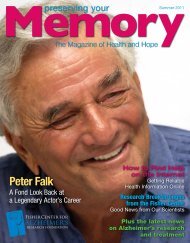Tracie Thoms - Fisher Center for Alzheimer's Research Foundation
Tracie Thoms - Fisher Center for Alzheimer's Research Foundation
Tracie Thoms - Fisher Center for Alzheimer's Research Foundation
You also want an ePaper? Increase the reach of your titles
YUMPU automatically turns print PDFs into web optimized ePapers that Google loves.
(continued from page 10)<br />
Why They Wander<br />
Wandering occurs <strong>for</strong> numerous reasons, says Maria<br />
Wellisch, R.N., vice president of corporate education <strong>for</strong><br />
Morningside Ministries in San Antonio, Texas (www.<br />
mmlearn.org). Some nursing-home residents head out the<br />
door when they see the staff getting their coats and purses<br />
to leave <strong>for</strong> the day. Other people wander because they<br />
think they need to go to a place they left years ago such as<br />
a <strong>for</strong>mer home, an office or someplace to fetch their kids.<br />
Some patients wander because they’re bored, anxious or<br />
physically uncom<strong>for</strong>table. Some may simply be confused.<br />
For the wanderer himself, the experience is much like<br />
going out into a mall parking lot and not knowing where<br />
you parked—without knowing why he’s out there. “We all<br />
do that, but at least I know I parked outside, “ Wellisch<br />
says. “These patients don’t have the connections in their<br />
brains to find their way back or even know why they are<br />
out there. And as the disease progresses, they lose the<br />
executive function to know to ask <strong>for</strong> help.”<br />
Who’s at Risk<br />
Certain people are at greater risk <strong>for</strong> wandering than<br />
others. Signs of a potential wanderer include someone who:<br />
• Returns from a regular walk or drive later than usual<br />
• Tries to fulfill <strong>for</strong>mer obligations, such as going to work<br />
• Tries or wants to “go home” even when at home<br />
• Paces, makes repetitive movements or is otherwise restless<br />
• Has difficulty locating familiar places like the bathroom,<br />
bedroom or dining room<br />
• Asks about the whereabouts of current or past friends and<br />
family<br />
• Acts as if doing a hobby or chore, but nothing gets done<br />
• Appears lost in a new or changed environment.<br />
Wandering can be very dangerous <strong>for</strong> the Alzheimer’s patient,<br />
who could fall, get struck by a car or assaulted by a stranger.<br />
For loved ones like Brenda Avadian, whose father wandered<br />
constantly, wandering can become a constant source of worry<br />
and concern. “It was like having a baby and wanting to wake<br />
up every time the baby cries,” she says. “Your ears are constantly<br />
tuned in to sounds in the night. It was absolutely exhausting.<br />
We started to show signs of impaired thinking, too.”<br />
After seven months of having her father in her home,<br />
Avadian put him in a nursing home. He died five years<br />
later at the age of 90 in 2001.<br />
Prevent Wandering<br />
Simple steps can deter some wanderers or at least make it<br />
less likely they’ll go far. Here are some suggestions:<br />
• Install an alarm system with a remote alarm that goes off<br />
in the caregiver’s bedroom. The alarm may be a motion<br />
detector or even one in the floor mat.<br />
• Place a chain lock high above the patient’s head or near<br />
the ground but not at eye level. The lock won’t prevent<br />
emergency rescue teams from entering, but may be<br />
enough to stop a patient from getting out.<br />
• Disguise the door. Hang a photo or mirror on the back,<br />
cover up the doorknob or place wallpaper on the door.<br />
• Adjust the color or texture of the door. Hang a sheet of<br />
black fabric over the door, or place a dark mat in front<br />
of it. Warner says this technique is known as “visual<br />
cliffing.” Patients may misinterpret the change in color or<br />
texture as a change in elevation, which may deter them<br />
from moving <strong>for</strong>ward.<br />
• Limit their distance by installing a fence or a gate with a<br />
gravity latch. Consider putting locks on outdoor gates.<br />
• Place a bench or chair near the door where a patient<br />
might exit. “It might not stop him, but he might sit<br />
down,” Warner says.<br />
• Dress the patient in bright colors. Bright clothes will<br />
make it easier <strong>for</strong> you to describe a wanderer later on to<br />
search teams if they do wander.<br />
• Alert the neighbors. Let everyone living nearby know<br />
that your relative might wander and suggest they call you<br />
if they see him. Make sure they also know what he looks<br />
like. Keep a list of your neighbors’ phone numbers handy<br />
in case you need to track down your relative.<br />
Finally, try to keep your relative occupied with<br />
purposeful tasks, which can help stave off the boredom<br />
and anxiety that may lead to wandering. “It should be<br />
something that can be done frequently, is purposeful and<br />
something they want to do,” Wellisch says. “Someone who<br />
likes to cook might want to ice cupcakes. With <strong>for</strong>mer<br />
nurses, I used to give them clipboards so they could make<br />
rounds with me. It should be something from their past<br />
that touches their memories.” ■<br />
Silver Alert<br />
If you have a relative who wanders, consider registering<br />
him or her in the National Silver Alert program. The free<br />
online program allows you to record vital in<strong>for</strong>mation<br />
about that person, which can be quickly given to<br />
emergency responders in the event the person wanders<br />
off and becomes lost. The program records vital medical<br />
and personal in<strong>for</strong>mation as well as a photo of the senior<br />
in an online database that is available 24/7. For more<br />
in<strong>for</strong>mation, check out www.nationalsilveralert.org.<br />
12 Preserving Your Memory summer 2010






